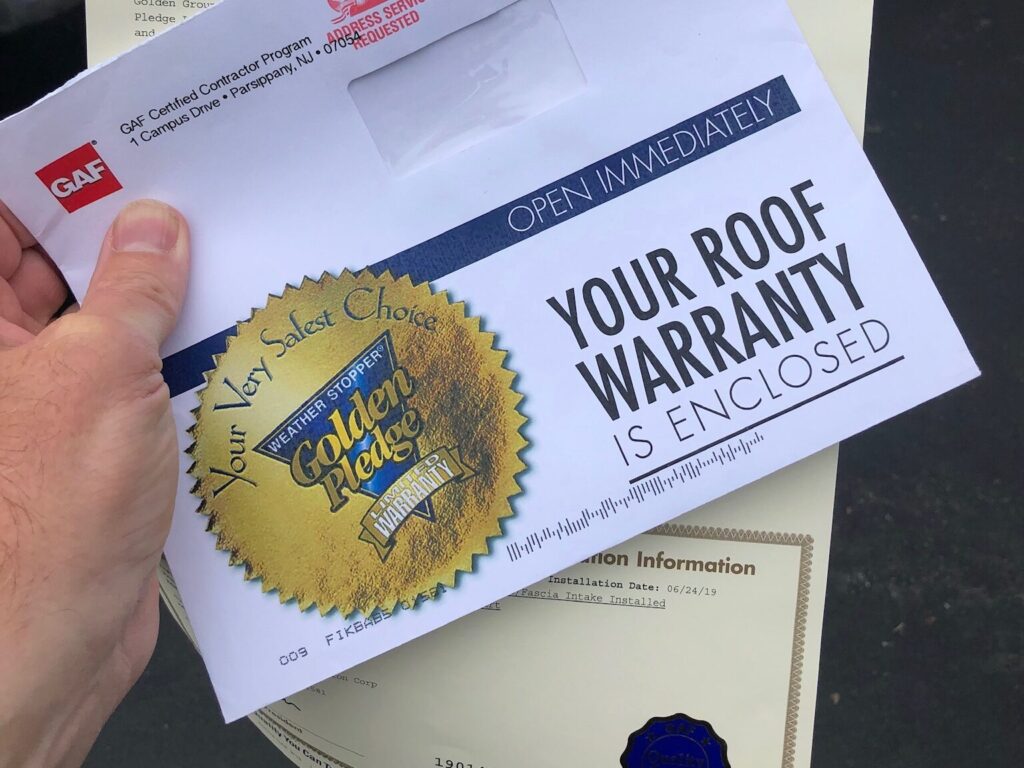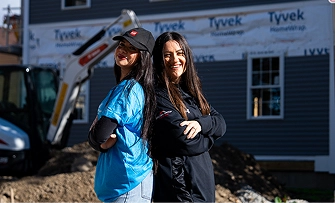Are Roofing Warranties Transferable?
During a sale of a home, you may be wondering if the roof warranty transfers to the new owner.
When installing a new roof, it’s important to ask, “Is my roofing warranty transferable.” You may not see the immediate value of getting what is known as a “transferable warranty,” but its value will become apparent when it’s time to sell your home.
Learn more about our roof warranties
What are the benefits of a transferable roof warranty?
Consider this: A manufacturer’s product warranty may last anywhere from 25 to 50 years, or even for the lifetime of the roof. Your workmanship warranty for materials and labor provided by the roofer may have a term of two years, ten years, 25 years, or even more. But will you own your home for the duration of the warranty?

Your home may be perfect for your family now, but circumstances change. Families have children. Parents get jobs in a new city. Empty nesters downsize. The median duration of homeownership in the US is 13 years, so you may very well move out while you still have years left on your roof warranty. So what happens if you have a 30-year warranty and move after 13 years, leaving seven years before it expires?
Contact us for a roofing quote today!
When selling a home while the roof is still under warranty, the best scenario is that the homeowner can transfer it to the buyer. However, this is only possible with a transferable warranty. This type of warranty also adds value to a home, giving buyers confidence that they are financially protected against the cost of repairs due to installation errors, defects, and leaks.
When considering a transferable warranty, know that the terms and conditions will vary among manufacturers, contractors, and even product lines from the manufacturer. This makes it critical that both home sellers and buyers understand the details of what the warranty covers.
What do you need to know about roofing warranties?
Transferable warranties usually have strict guidelines homeowners must follow. Since the process can vary along many lines, homeowners should carefully read the section on transferability and responsibilities. This is so that they do not void the warranty, making it impossible to transfer it to a new homeowner.
Make sure to ask your contractor these questions when getting a transferable warranty:
Is the contractor approved to offer a warranty for materials and craftsmanship?
Did the roofing contractor register the warranty upon installation?
How many times can a roof warranty transfer?

How and when do I have to arrange for a transfer?
How should you get the ball rolling on the warranty transfer when you sell your home? The first thing on your list is informing the roofing contractor and manufacturer you are requesting the transfer. If the homeowner is unable to provide the documents, the buyer should reach out to the contractor who installed the roof.
The seller or buyer should be prepared to provide these or other items as part of the transfer:
- Completed forms as required by the manufacturer or contractor
- Proof of installation, warranty commencement date, and remaining warranty period
- Receipt or proof of purchase that the manufacturer’s product that was used
- History of ownership of the roof warranty (Coverage of certain components may be reduced based on the age of the roof at the time of the transfer)
- A letter from the current owner stating their willingness to make the transfer and confirming that it won’t affect their premiums or coverage until the date of the transfer
- Closing documents that include the names of the prior and new property owner, along with the date of the property transfer
- Any administrative fees
Roof Maintenance Tips by a Certified Roofing Company
When you have completed all steps, you should be able to get a transfer document that include all relevant information. This includes the manufacturer, installation date, and expiration date. If there are any questions, the manufacturer or roofing contractor should be able to assist you through the transfer process.
Is there a deadline for the transfer?
Tips about transferring roof warranties for home buyers:
The homeowner has many responsibilities when it comes to transferring the warranty. But you can take steps to move the process along, including:
Find out the details of the roof warranty
If you’re a home buyer, part of your due diligence should be asking for the warranty registration and details. This includes the warranty period, transferability, what is (and is not) covered, if the warranty is prorated, and if you can transfer it to subsequent owners.
As the new owner, understand what voids the roof warranty. This is so that your home remains covered and you avoid paying out-of-pocket for future repair and replacement. These terms, conditions, and exclusions often include the homeowner’s responsibilities regarding roof inspections, ongoing maintenance, timely repairs, and exclusions such as violent storm damage.
Find out about the transfer process
While you’re looking into the terms and conditions of the warranty, find out how the transfer process works. Ask the seller who handles the transfer. Don’t forget to ask how to notify the contractor and manufacturer if the homeowner hasn’t done it already. This also includes details on time limitations, associated fees, documentation, and other paperwork. Note that the labor and materials warranties may have different expiration dates and other conditions.
Be informed about transferable roof warranties.
Explore with your contractor if a transferable warranty is the right way to go. You can ensure you get the full benefit of your new roof and warranty by working with a trusted, experienced roofing contractor like Golden Group Roofing. We care about protecting our customers throughout the Boston Area and New England. Call us at (508) 873-1884.






